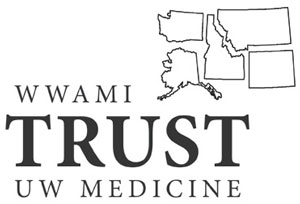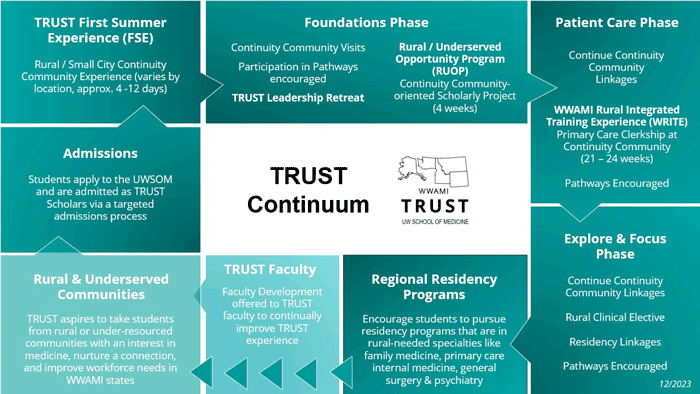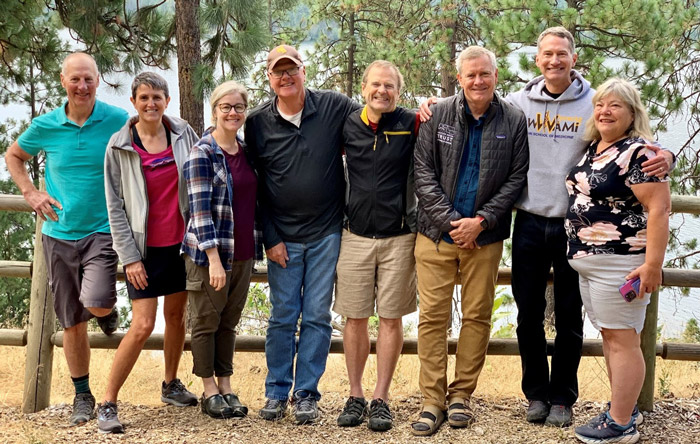Targeted Rural Underserved Track (TRUST) Program
- Need: There is a shortage of rural physicians in the Northwestern United States.
- Intervention: University of Washington medical students are receiving training through the TRUST program in rural communities across a five-state radius.
- Results: Long-lasting connections have been formed among regional communities, medical students, and rural health professionals, with the goal of producing more rural physicians.
Description
 The
Targeted Rural Underserved Track (TRUST) program is
designed to train and prepare University of Washington
medical students for future careers working in rural
areas and small cities throughout Washington, Wyoming,
Alaska, Montana, and Idaho (WWAMI). This longitudinal
medical school experience matches interested students
with expert physician preceptors located in targeted
communities across WWAMI, allowing students to become an
integral part of the system and form deep connections to
their continuity sites. TRUST is centrally administered
through the University of
Washington School of Medicine (UWSOM) Office of Rural
Programs.
The
Targeted Rural Underserved Track (TRUST) program is
designed to train and prepare University of Washington
medical students for future careers working in rural
areas and small cities throughout Washington, Wyoming,
Alaska, Montana, and Idaho (WWAMI). This longitudinal
medical school experience matches interested students
with expert physician preceptors located in targeted
communities across WWAMI, allowing students to become an
integral part of the system and form deep connections to
their continuity sites. TRUST is centrally administered
through the University of
Washington School of Medicine (UWSOM) Office of Rural
Programs.
TRUST seeks to provide a continuous connection between communities, medical education, and health professions in the WWAMI region. The program's goal is to create a full-circle community by guiding qualified students through a special curriculum that connects communities to the UW School of Medicine and its network of affiliated residency programs in an effort to help meet the workforce needs of the region.
The TRUST program has received support from:
- Washington Academy of Family Physicians and its Foundation
- Montana WWAMI Medical Education Program
- Washington Area Health Education Centers
- Idaho Medical Association
- University of Washington Department of Family Medicine
- University of Washington School of Medicine
The TRUST Program was originally funded by 2 Health Resources and Services Administration (HRSA) Title VII Grants.
Services offered
This unique curriculum connects WWAMI communities to the University of Washington School of Medicine and affiliated residency programs. A separate admissions process allows selected students to gain experience and build relationships with specific rural communities or small cities over the course of the student's medical school career.
TRUST is connected with existing courses and programs at the University of Washington, such as:
- Rural/Underserved Opportunities Program (RUOP)
- WWAMI Rural Integrated Training Experience (WRITE)
- Underserved Pathway
- WA AHEC Scholars Program
The TRUST Continuum shows students' involvement in TRUST throughout their medical school careers. (Some programming is dependent upon regional availability.)

Results
Since 2008, the TRUST program has had a positive impact on the region. A key feature of the University of Washington's efforts to address workforce shortages, TRUST has allowed for regionally based students to earn an M.D. while remaining close to home and in the communities that need providers most. As of 2024:
- 266 TRUST Scholars have graduated since the program's inception in 2008.
- 64% of these graduates matched into primary care residency programs. An additional 8% of TRUST graduates matched into General Surgery, 5% matched into Psychiatry, and 5% matched into Obstetrics and Gynecology residency programs - serving key workforce needs in rural communities.
The following articles offer a glimpse into how the TRUST program's efforts are received by students, preceptors, and regional partners alike:
- Kardonsky, K., Evans, D.V., Erickson, J., & Kost, A. (2021). Impact of a targeted rural and underserved track on medical student match into family medicine and other needed workforce specialties. Family Medicine, 53(2): 111-117.
- "Newport hospital welcomes newest doctor," Bonner County Daily Bee, 2024
- TRUST Program celebrates 10 years of training rural Idaho physicians, Idaho Capital Sun, 2022
- Keen, M., Bienz, D., Keys, T., Schaad, D., & Evans, D. (2019). The WRITE stuff: A rural longitudinal integrated clerkship addresses workforce needs. Journal of Regional Medical Campuses, 2(5).
- "On the Air: Medical Students Shine in Radio Program," Gonzaga University, 2024

Challenges
TRUST is a growing program, which means that significant resources and increasing coordination are required at each of the WWAMI sites. A somewhat decentralized network of campuses, clinics, faculty, and staff must work together to achieve the goals of the program equally across regions that vary in size, need, and demographics. Additionally, the TRUST program is not immune to changes in federal and state policies, and this has forced program administrators to adapt to changing guidelines as they come from government agencies and from the University of Washington at large. Staff and faculty have been nimble and resilient, showing that the future of the TRUST program remains strong.
Replication
To learn more about the TRUST program, visit:
- The Information for Applicants section to see the qualifications for applicants applying to the TRUST Program.
- The Curriculum section for an overview of the program's academic timeline.
- The Q&A section for answers to commonly asked questions relating to the program.
Contact Information
Frank Batcha, MD, Interim TRUST DirectorTRUST Program
batchf@uw.edu
Topics
Health workforce education and training
· Physicians
States served
Alaska, Idaho, Montana, Washington, Wyoming
Date added
December 8, 2014
Suggested citation: Rural Health Information Hub, 2025 . Targeted Rural Underserved Track (TRUST) Program [online]. Rural Health Information Hub. Available at: https://www.ruralhealthinfo.org/project-examples/780 [Accessed 22 February 2026]
Please contact the models and innovations contact directly for the most complete and current information about this program. Summaries of models and innovations are provided by RHIhub for your convenience. The programs described are not endorsed by RHIhub or by the Federal Office of Rural Health Policy. Each rural community should consider whether a particular project or approach is a good match for their community’s needs and capacity. While it is sometimes possible to adapt program components to match your resources, keep in mind that changes to the program design may impact results.
